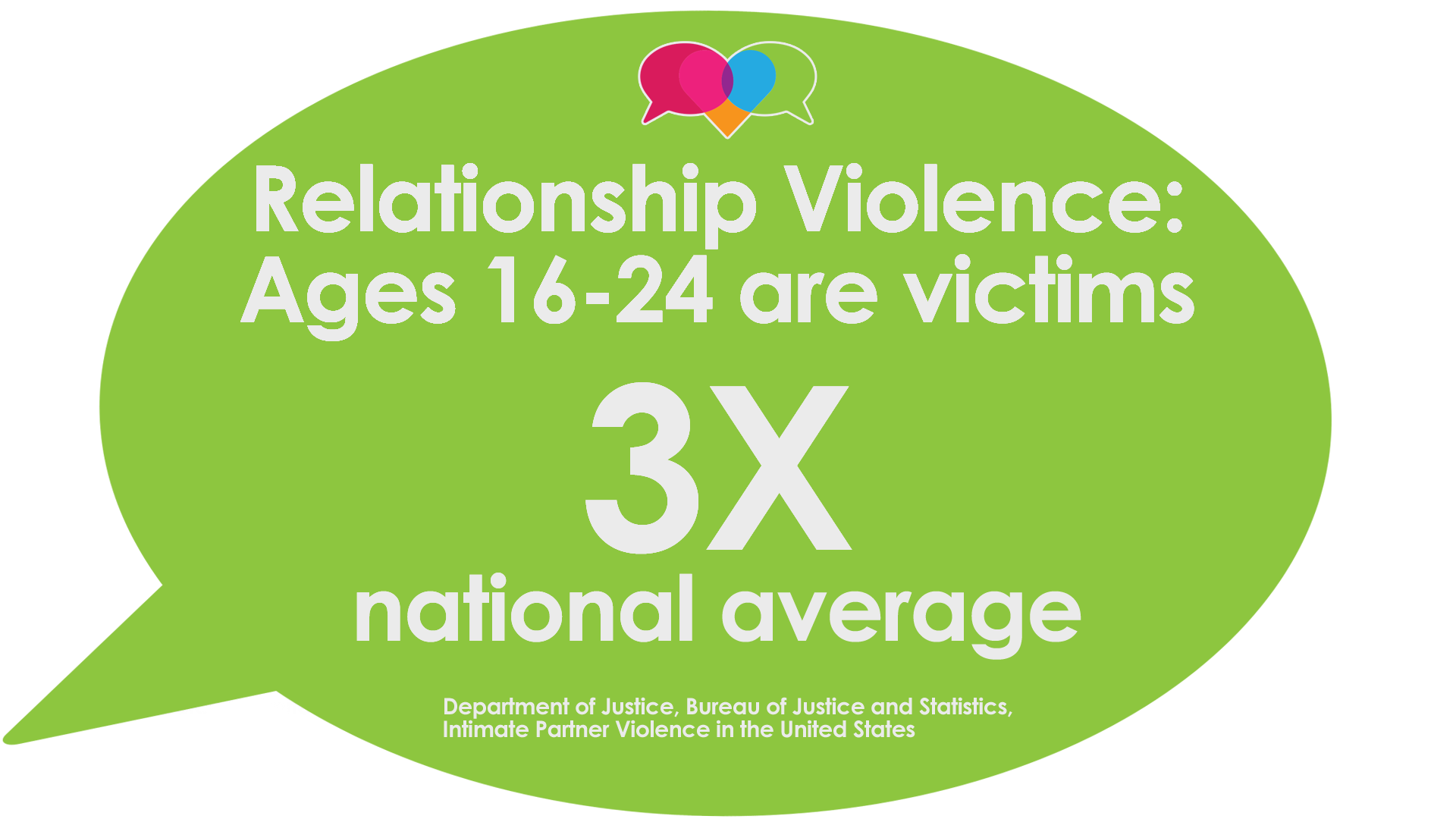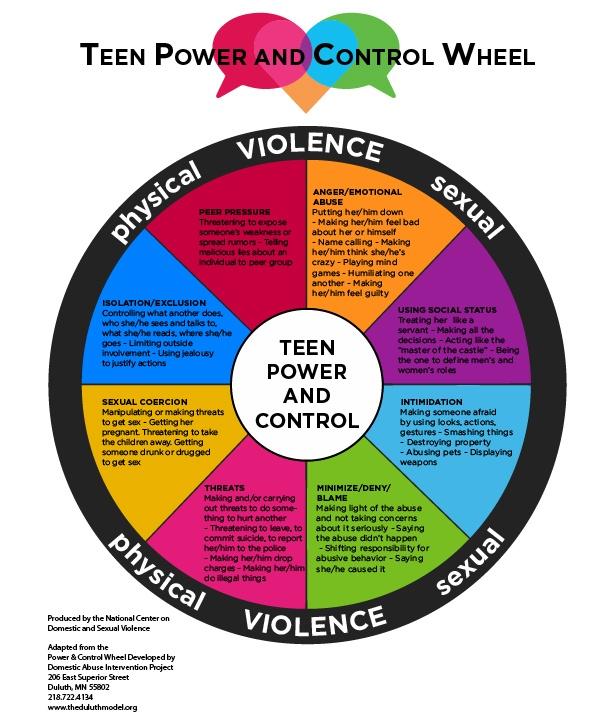
Reach out for free, confidential support from trained advocates at the Family Justice Center - 716.558.7223
Parents, learn how to identify the red flags and warning signs of abuse among teens and young adults and explore effective ways to begin the conversation with your child about healthy and unhealthy relationships.
Relationship abuse is more common than you think. One in three teenagers experience some form of relationship abuse from the people they are dating.
Only 33% of teens who have been in or known about an abusive relationship ever tell someone about it. It may surprise you that 16-24 year olds experience the highest rates of intimate partner violence—three times the national average.
Relationship abuse is a pattern of behaviors including physical, mental, sexual, emotional, digital and/or verbal abuse used to gain power and control over a partner. The abuse can happen over time and may continue to get worse.
Many teens do not report it because they are afraid to tell friends and family.
What Do I Need to Know?
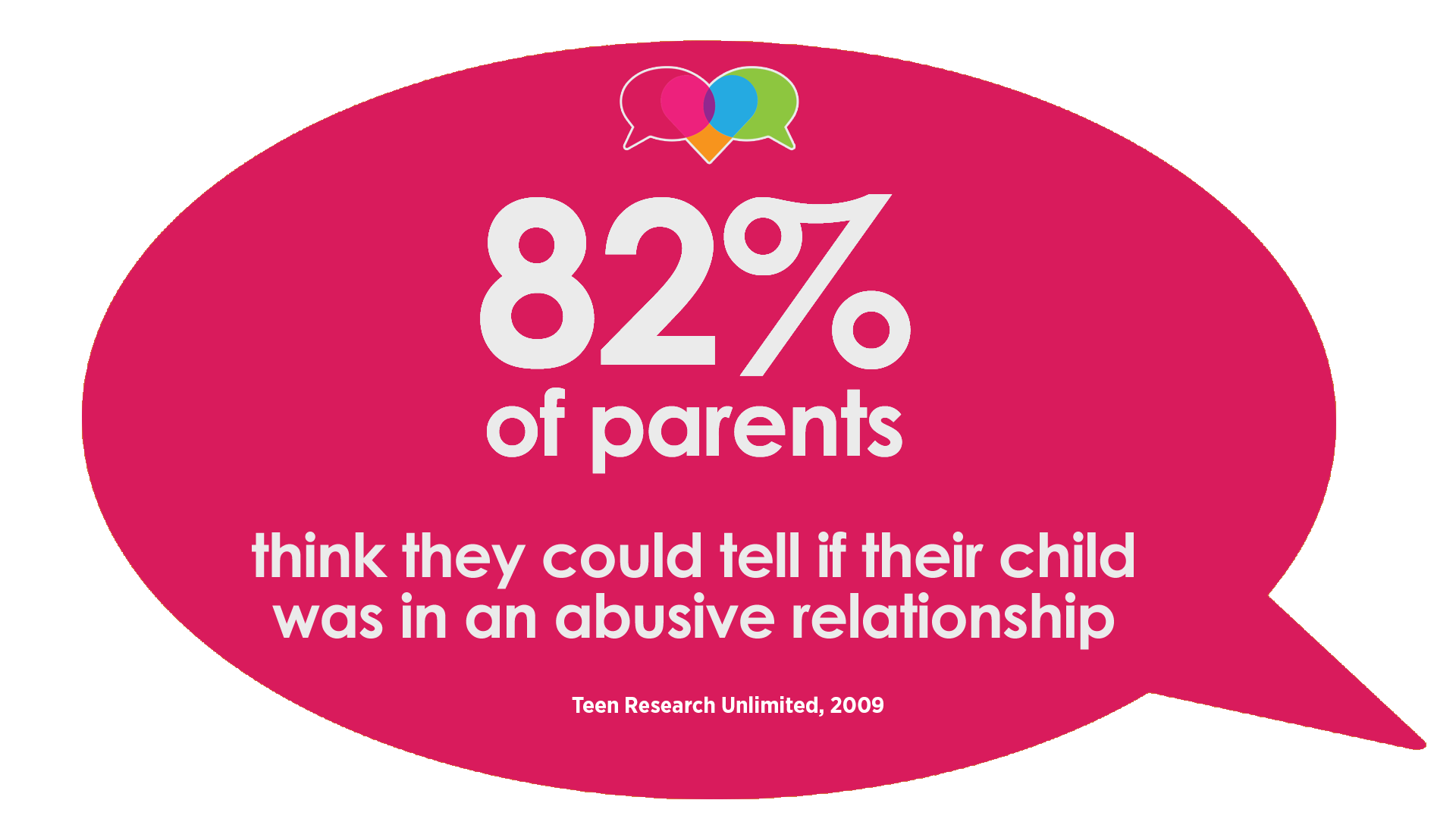
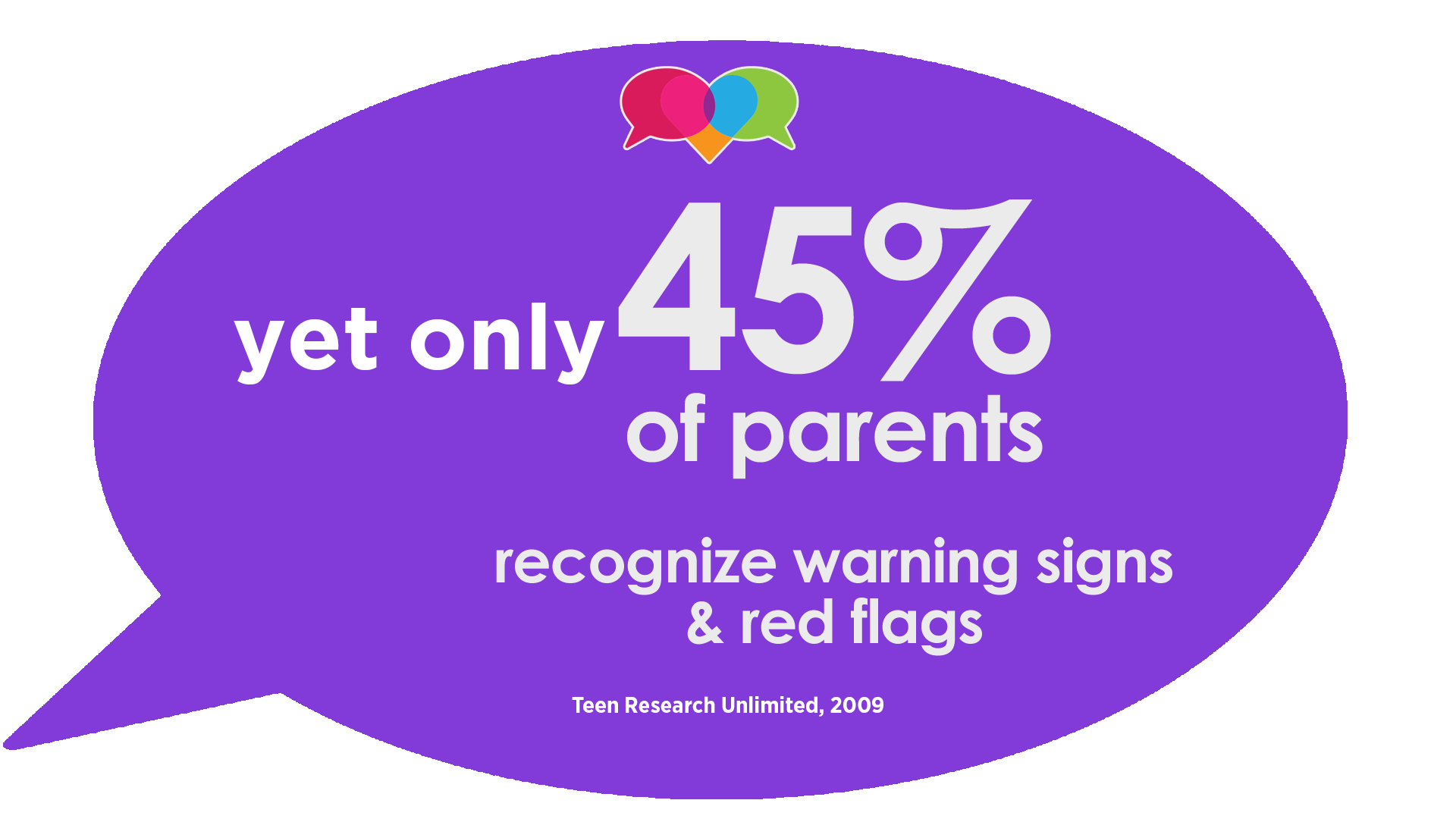
82% of parents said they could recognize if their teen was in an abusive relationship, but more than half could not recognize the warning signs. Statistics like these show us that relationship abuse is a startlingly common phenomenon, affecting people of all ages, races, nationalities, genders, religions, and socioeconomic groups. It also occurs in same-sex relationships.
Teens and young adults have a unique set of factors affecting their choices when it comes to romantic relationships, including peer pressure, the desire to be popular, lack of dating experience and mistaking jealous and controlling behavior as “love.” Often movies, music, video games and other popular culture support the belief that a girl belongs to a guy and he is in charge.
It’s important to know that teen relationship abuse can be as violent as adult domestic violence. Teens who experience or perpetrate abuse in their dating relationships are very likely establishing patterns of abuse that can carry on throughout their adult lives.
It can definitely be overwhelming to consider the prevalence of relationship abuse in teens and young adults, and even harder to watch your daughter or son live through painful and even dangerous relationships.
How to Recognize Unhealthy Relationships
Navigating through the teenage and young adult years can be challenging. Being able to tell the difference between healthy, unhealthy and abusive relationships can be more difficult than you would think.
Keep in mind that young people "date" differently than you did when you were their age. Instead of flowers and cards, today's young people often show their affection through technology, sending pics, social media statuses etc.
Although there are many signs to pay attention to when it comes to relationships, look for these common red flags and warning signs of relationship abuse:
Warning Signs and Red Flags
 They are depressed or anxious, or you notice changes in their personality
They are depressed or anxious, or you notice changes in their personality
 Stops seeing friends and family members and becomes more isolated
Stops seeing friends and family members and becomes more isolated
 Change in appearance
Change in appearance
 Apologizing for their partner's behavior and making excuses for them
Apologizing for their partner's behavior and making excuses for them
 Loss of interest in activities that she or he used to enjoy
Loss of interest in activities that she or he used to enjoy
 Partner controls your child's behavior, checking up on them constantly, calling and texting them, demanding to know who they have been with
Partner controls your child's behavior, checking up on them constantly, calling and texting them, demanding to know who they have been with
 Partner checks cell phones, emails or social networks without permission
Partner checks cell phones, emails or social networks without permission
 When they are together, their boyfriend/girlfriend calls them names, belittles or puts them down in front of others
When they are together, their boyfriend/girlfriend calls them names, belittles or puts them down in front of others
 Partner acts extremely possessive or jealous of others who pay attention to your teen, especially guys or girls they perceive as competition
Partner acts extremely possessive or jealous of others who pay attention to your teen, especially guys or girls they perceive as competition
 Partner thinks or tells your teen that you (parents) or friends don't like them
Partner thinks or tells your teen that you (parents) or friends don't like them
 They are constantly worried about making their partner angry
They are constantly worried about making their partner angry
 They have unexplained marks or injuries, or the explanations they offer don't make sense
They have unexplained marks or injuries, or the explanations they offer don't make sense
 They casually mention his or her violent behavior or explosive temper, but laugh it off as a joke
They casually mention his or her violent behavior or explosive temper, but laugh it off as a joke
 Partner exhibits extreme jealousy or insecurity
Partner exhibits extreme jealousy or insecurity
 You see their partner lose their temper, striking or breaking objects
You see their partner lose their temper, striking or breaking objects
 Partner abuses other people or animals
Partner abuses other people or animals
Power and Control
Every relationship is different, but the things that unhealthy and abusive relationships have in common are issues of power and control. Violent words and actions are tools an abusive partner uses to gain and maintain power and control over their partner.
What Does Relationship Abuse Look Like for Teens and Young Adults?
Physical Abuse: Any intentional use of physical force with the intent to cause fear or injury, like hitting, shoving, biting, strangling, kicking or using a weapon.
Verbal or Emotional Abuse: Non-physical behaviors such as threats, insults, constant monitoring, humiliation, intimidation, isolation or stalking.
Sexual Abuse: Any action that impacts a person’s ability to control their sexual activity or the circumstances in which sexual activity occurs, including rape, coercion or restricting access to birth control.
Digital Abuse: Use of technology and/or social media networking to intimidate, harass or threaten a current or ex-dating partner such as demanding passwords, checking cell phones, cyberbullying, non-consensual sexting, excessive or threatening texts or stalking on social media.
Stalking: Being repeatedly watched, followed, monitored or harassed. Stalking can occur online or in person, and may or may not include giving unwanted gifts.
Financial Abuse: Exerting power and control over a partner through their finances, including taking or withholding money from a partner, or prohibiting a partner from earning, or spending their money.
Relationship abuse . . .
…is a pattern of behaviors, not a single event or an isolated incident.
…will escalate over time. Relationships do not start off as abusive, and abuse can happen at a very slow pace. Little by little and sometimes very slowly, a relationship goes from healthy to unhealthy to abusive.
… comes in cycles. Even abusive relationships will have positive aspects and good times. Tension builds, escalates into an incident, and then there are often peaceful periods where the abuser apologizes and promises to change. However, the abuse will always return and will become more severe.
…is intentional. For a relationship to be abusive, one partner deliberately gains and maintains power and control over the victim. It is intentional, and the abuser is actively trying to change the victim’s behavior. When the victim doesn’t do what the abuser wants, the abuser will punish him or her. This punishment could range from verbal (like yelling or insulting) to physical. The victim will change his or her behavior to avoid punishment and accommodate the abuser.
What Can I Do?
If you think your daughter or son may be in an unhealthy relationship, having a conversation with them about it is essential. The most important thing you can do is be supportive and remind them that help is available.
Your next steps should be taken with care and caution – here’s why. You can easily make the situation worse! At this stage in your parenting journey, chances are you’ve begun to loosen the reigns. You’re letting your child have more control over their life and giving them more independence. You no longer tell them “what to do.” And they like it.
As a parent it's natural to want to take initiative, present your teen with ultimatums, or even forcibly remove them from the abusive situation.
Keep in mind that relationship abuse is all about power and control. Any attempt to swoop in and make demands of your child could backfire and make them shut down or may even put them in greater danger.
How to prepare:
Finding the right moment to talk about abuse can seem like a daunting task. Watch for signs that your teen wants to talk, such as if your teen hangs around where you are, but doesn’t necessarily say anything, or if your teen says he or she doesn’t feel well but there doesn’t seem to be anything physically wrong.
Find a private space where you can talk, away from siblings or anyone else that might overhear your conversation. Keep it low key. Don’t push it if your child is not ready to talk. Try again another time.
Look through the resources on this site and learn as much as you can about relationship abuse, red flags and warning signs. Consider reaching out for additional resources or guidance from trained advocates.
What to do/say:
Privacy and confidentiality are key. Let them know that whatever you talk about will stay between the two of you. This is the only way you'll build their trust and keep that door open.
Be supportive and listen. Abusive partners will often try to isolate the victim from family and friends so they can have total power and control without any interference. Remember your child may not recognize the abuse or even want to leave or stop. This is difficult when you clearly see the signs.
Try to listen without judgment. Try not to speak negatively about the abusive partner. This may put the victim on the defense, because they have already been manipulated to believe that the abuse is their fault. Alternatively, they may feel embarrassed or ashamed that they “allowed” the abuse to happen.
Start the conversation with questions like "How are things going?," "What are your friends' relationships like?," "Have you seen any kind of abusive behavior with your friends or peers?," "What does that look like?," "Why you think one person would abuse the other when dating?," "Why might a person stay in an abusive relationship?'" and "What makes a relationship healthy?"
Talk about behaviors or red flags you've seen. Tell them you have noticed certain things that concern you. Ask them if they have noticed the same and how that behavior makes them feel. Tell them about specific times you have been worried about them. Point out that what's happening isn't "normal." Everyone deserves a healthy and safe relationship.
Listen and believe them. Say things like, “I’m sorry this is happening to you,” “I know it’s complicated,” “It’s not your fault,” “You don’t deserve this,” and “This doesn’t change how I feel about you." Make it clear that you don’t blame your teen and that you respect his or her choices. Your child may be reluctant to share their experiences in fear of no one believing what they say. Be careful not to minimize your child’s situation due to age, inexperience or the length of their relationship.
What you see or hear may make you frustrated and upset. If this happens try to stay calm. If you give them an ultimatum like “you can't see him/her anymore,” that closes the door of communication.
Remind them that he or she deserves a healthy violence-free relationship and that they didn't cause this, abuse is NEVER appropriate and NEVER their fault.
Focus on your child, not their partner. Even if they stay with them, it's important they still feel comfortable talking to you about it.
Listen, but acknowledge that you are not an expert. Empower them with the tools to act when they’re ready. Encourage them to reach out and connect with resources in the community like the Family Justice Center which offers confidential help, information and guidance from trained advocates.
Be patient. On average, it takes domestic violence survivors seven times to leave the relationship for good. Continue offering support in any way you can. Believing and supporting them can be a major factor in helping them stay safe or helping your child find their own way to end their unhealthy relationship when they’re ready. Let them know that you'll always be there no matter what.
What NOT to do/say:
- Don’t try to control the situation. As a parent, your instinct is to jump in and protect your child. You can easily see the solution and you want to just fix it. Remember you can’t “rescue” them.
- Don't blame or judge. Don’t make your teen feel like they brought this on. They already get “blame” in their current unhealthy relationship. Your daughter or son did not cause this. It's not their fault. Be careful about this, because you can show judgement in your body language.
- Don't make demands or offer advice. Never start a sentence with "You should" or "You shouldn't.” Keep in mind that relationship abuse is all about power and control. Any attempt to swoop in and make demands of your child could backfire and make them shut down. Instead, you can help shift power back to them by trusting that they know their situation best, and letting them know you are there to provide help and support.
- Don't confront their abuser.
- Don't wait for them to come to you.
- Don't try to fix this by yourself. There are people who are trained and see this every day, find resources and people who can help not just the victim, but you too.
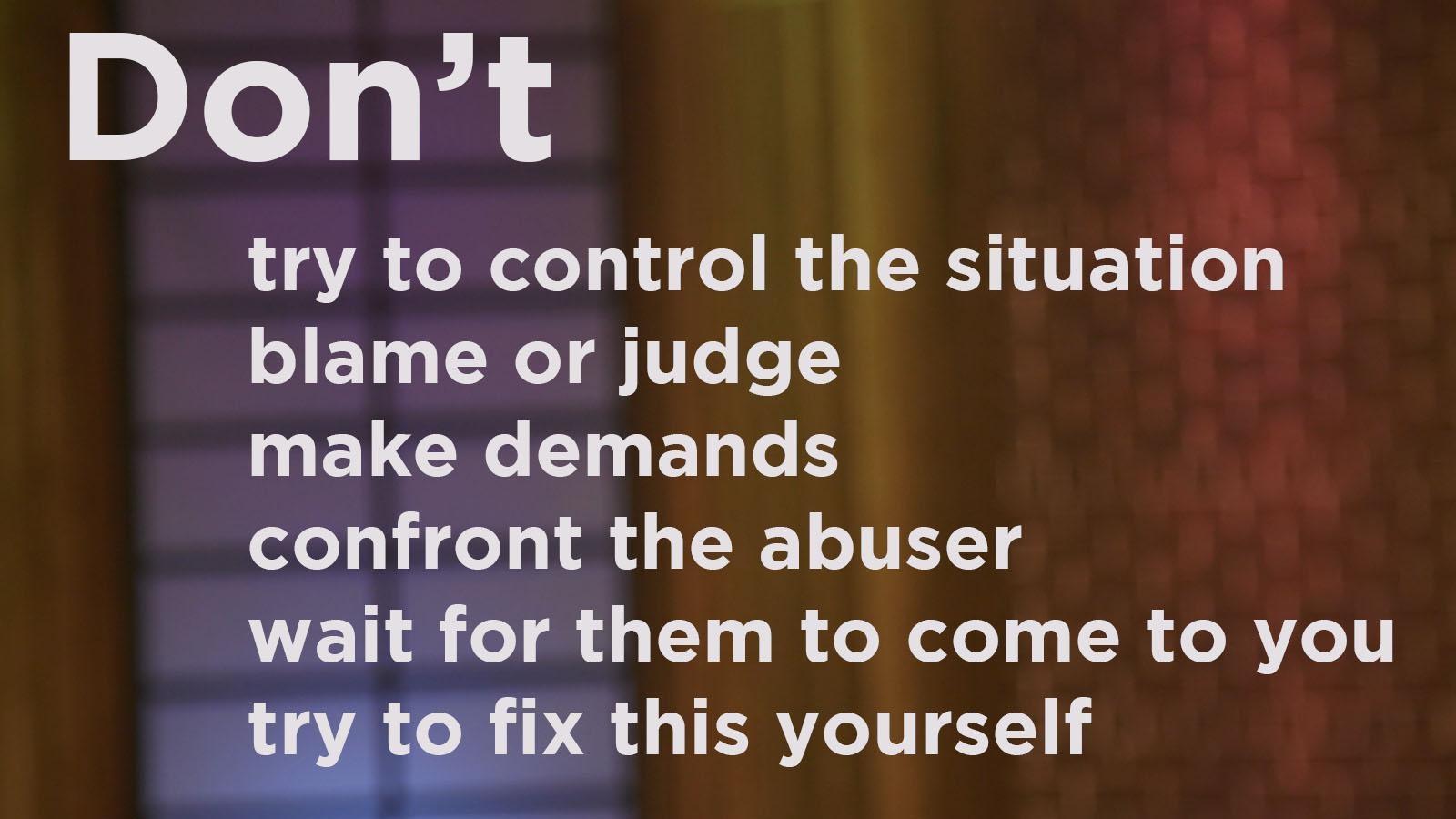
Staying quiet could have dire consequences. It’s too important to ignore. It literally could save their life. Even when you feel like there’s nothing you can do, don’t forget that by being supportive and caring, you’re already doing a lot.
Need More Support? | Reach Out
If your son or daughter isn’t ready to openly communicate with you about his or her relationship, let him or her know there are free, confidential services and trained individuals available to answer questions and help avoid unhealthy relationships. Pass on the information below, but let them know you are always available to talk.
